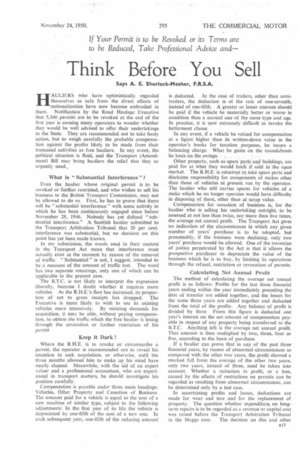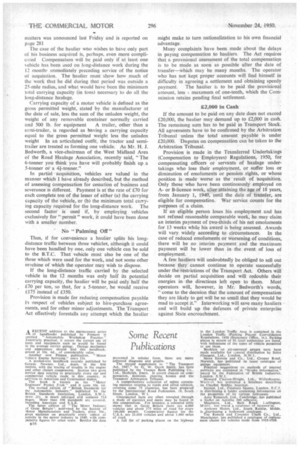Think Before You Sell
Page 49

Page 50

If you've noticed an error in this article please click here to report it so we can fix it.
If Your Permit is to be Revoked or its Terms are to be Reduced, Take Professional Advice and— Says A. E. Sherlock-Mesher, F.R.S.A.
HAULIERS who have optimistically regarded themselves as safe from the direct effects of nationalization have now become embroiled in them. Notification by the Road Haulage Executive that 5,300 permits are to be revoked at the end of the first year is causing many operators to wonder whether they would be well advised to offer their undertakings to the State. They are recommended not to take hasty action, but to weigh carefully the probable compensation against the profits likely to be made from their truncated activities as free hauliers. In any event, the political situation is fluid, and the Transport (Amendment) Bill may bring hauliers the relief that they so urgently need..
What is "Substantial Interference" ?
Even the haulier whose original permit is to be revoked or further restricted, and who wishes to sell his business to the British Transport Commission, may not be allowed to do so. First, he has to prove that there will be "substantial interference" with some activity in which he has been continuously engaged since before November 28, 1946. Nobody has yet defined "substantial interference." A Scottish haulier submitted to the Transport Arbitration Tribunal that 20 per cent. interference was substantial, but no decision on this point has yet been made known.
In my submission, the words used in their context in the Transport Act mean that interference must actually •exist at the moment by reason of the removal of traffic_ "Substantial" is not, I suggest, intended to be a measure of the amount of traffic lost. The word has two separate meanings, only one of which can be applicable in the present case.
The B.T.C. is not likely to interpret the expression liberally, because I doubt whether it requires more vehicles As the R.H.E.'s fleet has increased, its proportion of net to gross receipts has dropped. The Executive is more likely to wish to use its existing vehicles more intensively. By resisting demands for acquisition, it may be able, without paying compensation, to obtain the traffic which the free haulier is losing through the revocation or further restriction of his permit
Keep it Dark !
Where the R.H.E. is to revoke or circumscribe a permit, the operator is recommended not to reveal his intention to seek acquisition, or otherwise, until the three months allowed him to make up his mind have nearly elapsed. Meanwhile, with the aid of an expert valuer and a professional accountant, who are experienced in transport matters, he should investigate his position carefully.
Compensation is payable under three main headings: Vehicles, Other Property and Cessation of Business. The amount paid for a vehicle is equal to the cost of a new machine of similar type, subject to the following adjustments: In the first year of its life, the vehicle is depreciated by one-fifth of the cost of a new one. In each subsequent year, one-fifth of the reducing amount
is deducted. In the case of trailers, other than semi trailers, the deduction is at the rate of one-seventh, instead of one-fifth. A greater or lesser amount should be paid if the vehicle be materially better or worse in condition than a normal one of the same type and age. In practice, it is now extremely difficult to invoke the betterment clause.
In any event, if a vehicle be valued for compensation at a figure higher than its written-down value in the operator's books for taxation purposes, he incurs a balancing charge. What he gains on the roundabouts he loses on the swings. • .,_
Other property, such as spare parts and buildings, are paid for at what they would fetch if sold in the open market. The R.H.E. is reluctant to, take spare parts and disclaims responsibility for components of makes other than those of vehicles at present run by the operator. The haulier who still carries spares for vehicles of a make which he no longer operates would have difficulty in disposing of them, other than at scrap value.
Compensation for cessation of business is, for the haulier who is selling his undertaking outright, to be assessed at not less than twice; nor more than five times, the average net annual profit. The Transport Act gives no indication of the circumstances in which any given number of years' purchase is to be adopted, but presumably, if the business were declining, only two years' purchase would be allowed. One of the travesties of justice perpetrated by the Act is that it allows the prospective purchaser to depreciate the value of the business which he is to buy, by limiting its operations through the refusal, restriction or revocation of permits.
Calculating Net Annual Profit The method of calculating the average net annual profit is as follows: Profits for the last three financial years ending within the year immediately preceding the date of transfer are added together, and the losses for the same three years are added together and deducted from the total of the profits. Any balance of profit is divided by three From this figure is deducted one year's interest on the net amount of compensation payable in respect of any property being transferred to the B.T.C. Anything left is the average net annual profit. That amount is then multiplied by two, three, four or five, according to the basis of purchase.
If a haulier can prove that in any of the past three financial years, by reason of abnormal circumstances as compared with the other two years, the profit showed a marked fall from the average of the other two years, only two years, instead of three, need be taken into account. Whether a reduction in profit, or a loss, caused by the effects of restrictions on permits can be regarded as resulting from abnormal circumstances, can be determined only by a test case.
In ascertaining profits and losses, deductions are made for wear and tear and for the replacement of property. The question whether expenditure„ on longterm repairs is to be regarded as a revenue or capital cost was raised before the Transport Arbitration Tribunal in the Maggs case. The decision on this and other matters was announced last Friday and is reported on page 281 The case of the haulier who wishes to have only part of his business acquired is, perhaps, even more complicaied Compensation will be paid only if at Least one 'vehicle has been used on long-distance work during the 12 month" immediately preceding service of the notice of acquisition. The haulier must show how much of the work that he did during that period was outside a 25-mile radius, and what would have been the minimum total carrying capacity (in tons) necessary to do all the long-distance haulage.
Carrying capacity of a motor vehicle is defined as the gross permitted weight, stated by the manufacturer at the date of sale, less the sum of the unladen weight, the weight of any removable container normally carried and 500 lb. for equipment A trailer, other than a s-....mi-trailer, is regarded as having a carrying capacity equal to the gross permitted weight less the unladen weight In an articulated outfit, the tractor and semitrailer are treated as forming one vehicle. As Mr. H. J. Bedworth, a vice-chairman of the West Midland Area of the Road Haulage Association, recently said, "The 6-tonner you think you have will probably finish up a 5-tonner of a 4i-tonner."
In partial acquisition, vehicles are valued in the manner which I have already described, but the method of assessing compensation for cessation of business and severance is different. Payment is at the rate of £70 for each complete ton of the lesser of either (a) the carrying capacity of the vehicle, or (b) the minimum total carrying capacity required for the long-distance work. The second factor is used if, by employing vehicles exclusively for " permit " work, it could have been done with a smaller number.
No "Palming Off" Thus, if for convenience a haulier splits his longdistance traffic between three vehicles, although it could have been handled by one, only one vehicle can be sold to the B.T.C. That vehicle must also be one of the three which were used for the work, and not some other mIchine of which the operator may wish to dispose.
If the long-distance traffic carried by the selected vehicle in the 12 months was only half its potential carrying capacity, the haulier will be paid only half the £70 per ton, so that, for a 5-tonner, he would receive £175 instead of £350.
Provision is made for reducing compensation payable fri,respect of vehicles subject to hire-purchase agreements, and for other minor adjustments. The Transport Act effectively forestalls any attempt which the haulier
might make to turn nationalization to his own financial advantage.
Many complaints have been made about the delays in paying compensation to hauliers. The Act requires that a provisional assessment of the total compensation is to be made as soon as possible after the date of transfer—which may be many months. The operator who has not kept proper accounts will find himself in difficulty in agreeing a settlement and obtaining speedy
payment. The haulier is to be paid the provisional amount, less maximum of one-tenth, which the Commission retains pending final settlement.
£2,000 In Cash
If the amount to be paid on any date does not exceed £20,000, the haulier may demand up to £2,000 in cash. The remaining sum has to be paid in Transport Stock. All agreements have to be confirmed by the Arbitration Tribunal unless the total amount payable is under £20,000. Disputes on compensation can be taken to the Arbitration Tribunal.
Provision is made in the Transferred Undertakings (Compensation to Employees) Regulations, 1950, for compensating officers or servants of haulage undertakings who lose their employment, or suffer Joss or diminution of emoluments or pension rights, or whose position is made worse as the result of acquisition. Only those who have been continuously employed on Aor B-licence work, after attaining the age of 18 years, from January 1, 1940, until the date of transfer, are eligible for compensation. War service counts for the purposes of a claim.
If an eligible person loses his employment and has not refused reasonable comparable work, he may claim an interim payment of two-thirds Of his net emoluments for 13 weeks while his award is being assessed. Awards will vary, widely according to circumstances. In the case of reduced emoluments or worsening of conditions, there will be no interim payment and the maximum payment will be lower than in the event of loss of employment.
A. few hauliers will undoubtedly be obliged to sell out because they cannot continue to operate successfully under the restrictions of the Transport Act. Others will decide on partial acquisition and will redouble their energies in the directions left open to them. Most operators will, however, in Mr. Bedworth's words, "come to the decision that the amount of compensation they are likely to get will be so small that they would be mad to accept it." Interworking will save many hauliers and will build up the defences of private enterprise against State encroachment.




























































































